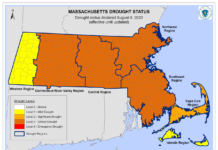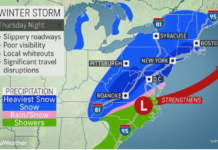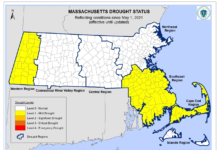By Molly Callahan
News at Northeastern
This year, besides choosing a president, Massachusetts voters will have the chance to weigh in on four statewide ballot questions whose topics range from livestock to recreational marijuana.
We checked in with John Portz, political science professor in the College of Social Sciences and Humanities and interim chair of the Department of Political Science, who said it’s important to vote even if at first it seems the topics may not affect you personally.
“These are not really taxpayer issues per se; more often what these laws do is create some kind of policy to deal with an issue,” Portz said. “In general, these proposals would impact quality of life.”
While some municipalities might include a number of additional, local questions, every Massachusetts voter will encounter four statewide questions on their ballots. Here’s a breakdown of what those questions mean for voters.
1. Expanded slot-machine gaming
If passed, this law would allow the state Gaming Commission to issue a second slots parlor license in the state. The letter of the proposed law is very narrow, however—the parlor would have to be located on property that is set on at least four acres, within 1,500 feet of a horse racing track, and can not be separated from the track by a highway or railway.
A “yes” vote would allow, but not compel, the Gaming Commission to license a second slots parlor.
A “no” vote would leave the laws as-is.
“It really comes down to a question of how one feels about gambling in general and whether the state should be supportive of that,” Portz said. “That was the debate that created the original casino process in Massachusetts.”
2. Charter school expansion
This question asks voters whether Massachusetts should raise its cap on charter schools in the state. Specifically, if passed, the law would allow the state to approve up to 12 new charter schools or enrollment expansions per year. If the state got more than 12 applications in a year, this proposed law would give priority to lower-performing school districts. If approved, the new law would go into effect on Jan. 1, 2017.
Currently, the law only allows for 120 charter schools to open up in the commonwealth. Seventy-eight are currently in operation.
A “yes” vote would allow for up to 12 approvals each year of either new charter schools or expanded enrollments in existing charter schools, but not to exceed 1 percent of the statewide public school enrollment.
A “no” vote would leave the charter school cap as it stands.
“On the plus side, this would create an opportunity for more charter schools, which creates more opportunities for families in communities where they’re not happy with the traditional public schools,” Portz said. “On the negative side, it diminishes local control because charter schools are not beholden to local school committees.”
Proponents argue that charter schools are helping to close the achievement gap among students, while opponents contend charter schools will siphon away millions of dollars from the state’s public schools.
3. Conditions for farm animals
This question relates to the treatment of farm animals, specifically breeding pigs, calves raised for veal, and egg-laying hens. The proposed law would prohibit any farm owner or operator from knowingly confining those animals in a way that prevents them from laying down, standing up, fully extending their limbs, or turning around freely. It would also prohibit businesses from selling eggs, veal, or pork from farms that confined the animals improperly.
If approved, the law would go into effect on Jan. 1, 2022.
WBUR reports that there’s only one farm in the state whose current captivity practices would put them in violation of the law, if it passes. Opponents are more focused on the second half of the proposed law, which they say could increase the price of eggs, veal, and pork.
A “yes” vote would prohibit any confinement of pigs, calves, and hens that prevents those animails from laying down, standing up, fully extending their limbs, or turning around freely.
A “no” vote would not impose any new restrictions on farm animals or their products in the state.
Portz said the lead time on this proposed law—more than five years, if it’s approved this month—was unusually long. “Presumably that is to give farms the time to adjust to the new requirements,” he said.
As for the potential price hike? “The question is really how significant that would be, and my guess is it would be somewhat marginal,” he said.
4. Legalization, regulation, and taxation of marijuana
Perhaps the most hotly discussed of the ballot questions, Question 4 asks voters whether Massachusetts should legalize recreational marijuana. If approved, the law would allow adults over 21 to possess up to one ounce of marijuana outside their homes; up to 10 ounces inside their homes; grow up to six marijuana plants in their homes for personal use as long as no more than 12 plants are cultivated on the premises at one time; give up to one ounce of marijuana to someone else who is 21 or older without payment; and make products related to marijuana use, storage, cultivation, or processing.
The law would also create a three-person Cannabis Control Commission that would be responsible for oversight. Proceeds from the retail sale of marijuana would be subject to the state sales tax and a 3.75 percent excise tax. Individual municipalities could also impose a third tax on top of that, up to 2 percent.
Public consumption of marijuana and driving while high would still be illegal if Question 4 is approved.
If it passes, the law would take effect on Dec. 15, 2016, and stores could open by early 2018.
Even if it passes, individual municipalities have the opportunity to opt out (by referendum vote) of having marijuana stores, cultivation facilities, and product manufacturers in their city or town.
A “yes” vote would legalize the possession, use, transfer, and sale of marijuana and marijuana products by and to people 21 and older. It would also provide for the regulation and taxation of the commercial sale of marijuana.
A “no” vote would keep it illegal.
Either vote, however, doesn’t affect the use and distribution of medical marijuana, which has already been approved in Massachusetts.
For Portz, the question is whether the state has the administrative infrastructure to deal with the changes the law would create, if it’s passed.
“Are we ready to implement this, in terms of creating the legal structure to regulate and license providers?” he asked. “Some say there’s no way the state can respond and deal with all the implications this has by Dec. 15. Whether there’s the capability to handle this is a big question.”
Still, he said, “Legalizing something that can have detrimental effects is a way for the government to step in and control its use. Better to legalize it than ban it.”
On the other hand, Portz said, “Why would we want to make more easily available another substance that can put people in negative conditions?”
(Published with permission from News at Northeastern)

















